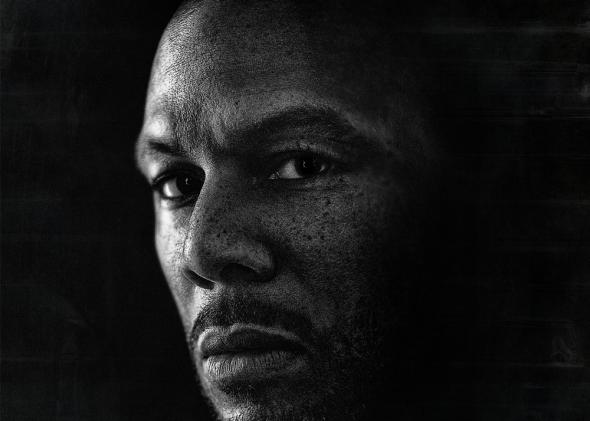You Should Still Be Listening to Common, and Here’s Where to Start With His Recent Work

Image via Nobody's Smiling artwork.
In 2014, it might be tempting to write Common off as a relic of hip-hop’s “golden age,” a rapper who can’t seem to eclipse his past critically acclaimed work, like 2000’s Like Water for Chocolate or 2005’s classic Be. In fact, you might even forget he still makes music at all, given that he’s increased his focus on acting in recent years with starring roles in movies like 2010’s Just Wright and shows like AMC’s Hell on Wheels. But to dismiss Common’s recent work is unfair and a mistake, especially given the strength of such stellar projects as 2011’s The Dreamer, The Believer and his 10th studio album, Nobody’s Smiling, released on Tuesday.
His new album is a candid study of his hometown of Chicago that displays some of Common’s darkest and most aggressive work to date—e.g., he begins his first verse on gritty album opener “The Neighborhood” by name-checking the city’s most notorious gangs. This opening sets the album’s austere tone, one needed to approach its tale of urban decay. And although Nobody’s Smiling’s sometimes-scatterbrained narrative falls short of making the disruptive statement Common likely intended, as some critics note, it’s a conversation starter about the city’s epidemic of violence that’s long overdue.
Nobody’s Smiling is also more proof that after a 20-plus-year career in rap, Common remains one of the genre’s best storytellers. It’s only the latest reason you should still be paying attention to what he has to say—even if you tuned out in the mid-2000s.
Before we get to his most recent work, a brief history of how we got here. Born on the South Side of Chicago, Common got his start in that city in the early ’90s under the moniker Common Sense. (He later shortened the name after being sued by the reggae band of the same name.) His demo scored him enough attention to earn him a feature in the Source’s “Unsigned Hype” column, and he built upon his hometown buzz with his 1992 debut, Can I Borrow a Dollar? But it was off the strength of his 1994 sophomore album, Resurrection, and its standout track, “I Used to Love H.E.R.”—still the best song he’s ever done—that rap fans outside of Chicago began to take notice of his lyrical dexterity.
His next notable work came in 2000 with his fourth album Like Water for Chocolate, which was inspired by a move to New York City and his joining the neo-soul musicians collective known as the Soulquarians—Questlove, Talib Kweli, Erykah Badu, Mos Def, Q-Tip, et al. The album, his first with production from the late Detroit producer J Dilla, experimented with Afrocentrism and a more soul-influenced sound. And it became his first album to go gold, helped, in part, by his Grammy-nominated “The Light.” But in 2005, after releasing the polarizing Electric Circus, Common hooked up with another producer, Kanye West, to create what has been regarded as his masterpiece: Be, which XXL then described as “flawless.” That partnership sparked Common’s most melodic, introspective work ever, reflected in bar-setting songs like “They Say,” “Go,” “The Corner,” and “Testify”—not to mention, one of hip-hop’s greatest album openers, “Be (Intro).”
Common’s four subsequent albums since Be might not have transcended that album’s brilliance or innovation, but that shouldn’t deter fans from giving them their due. Because even with his latest, Nobody’s Smiling, Common has demonstrated an ability to continue to develop his craft and stay culturally relevant. With each album, we discover new facets to Common’s artistry: 2007’s Finding Forever revealed a cinematic flair to his storytelling, while 2008’s Universal Mind Control showed Common’s ability to adapt to different styles of production—the Neptunes then pushing him to experiment with a more pop-leaning sound. And when Common reunited with producer No I.D. for 2011’s The Dreamer, The Believer, he delivered his most consummate achievement since Be and an album I’d rate as among the best of its year.
Many tracks from these albums also revisit the strengths he demonstrated earlier in his career. In “Cloth” from The Dreamer, The Believer, he returns to the allegorical style that many fans first fell in love with on “I Used to Love H.E.R.” Describing his relationship like a snug-fit garment, he tells how he and his lover “can cover each other/ Through the coldest nights, tight—never smother.” On “Lovin’ I Lost,” from that same album, he brings the story he told on 2005’s “Love Is…” full circle. He references Mary J. Blige once again, but this time he’s describing the trauma of loss: “I’m singing through the pain like I was Mary J,” he laments, mourning the love for which he once fought so hard.
Of course, the best way to appreciate the high points of Common’s late-career material is to actually listen to it. If you’ve spent the last few years overlooking his work, spend some time getting reacquainted with the versatile rapper with a few of his best post-Be tracks, below.
“I Want You” ft. will.i.am (Finding Forever, 2007)
“Drivin’ Me Wild” ft. Lily Allen (Finding Forever, 2007)
“Universal Mind Control” ft. Pharrell (Universal Mind Control, 2008)
“Punch Drunk Love (The Eye)” ft. Kanye West (Universal Mind Control, 2008)
“Cloth,” (The Dreamer, The Believer, 2011)
“Lovin’ I Lost” (The Dreamer, The Believer, 2011)
“The Morning” ft. Kanye West, Raekwon, Pusha T, 2 Chainz, Cyhi the Prynce, Kid Cudi, and D’banj (Cruel Summer, 2012)
“Speak My Piece” (Nobody’s Smiling, 2014)
“The Neighborhood ft. Lil’ Herb and Cocaine 80s (Nobody’s Smiling, 2014)
“Kingdom” ft. Vince Staples (Nobody’s Smiling, 2014)
